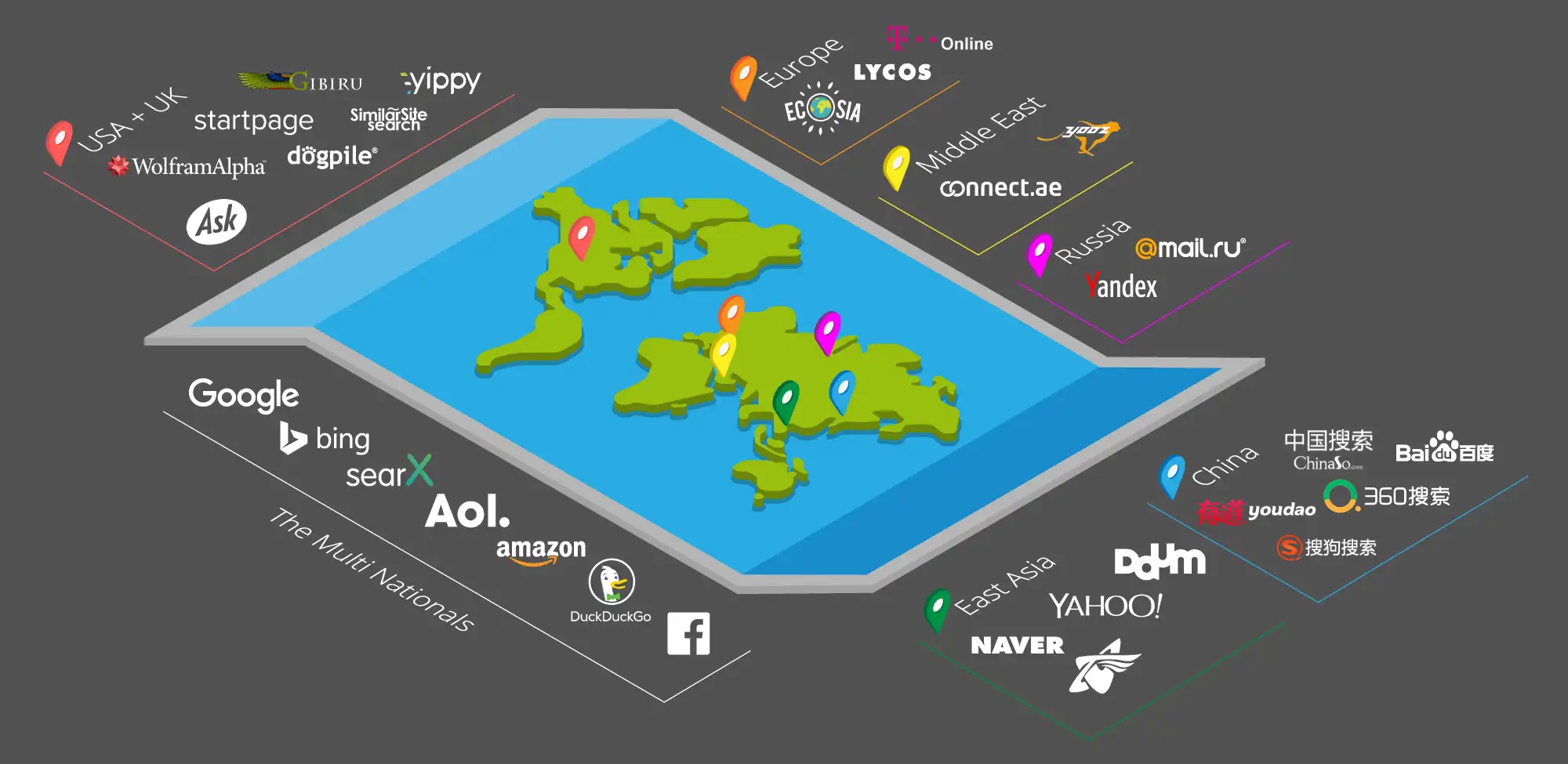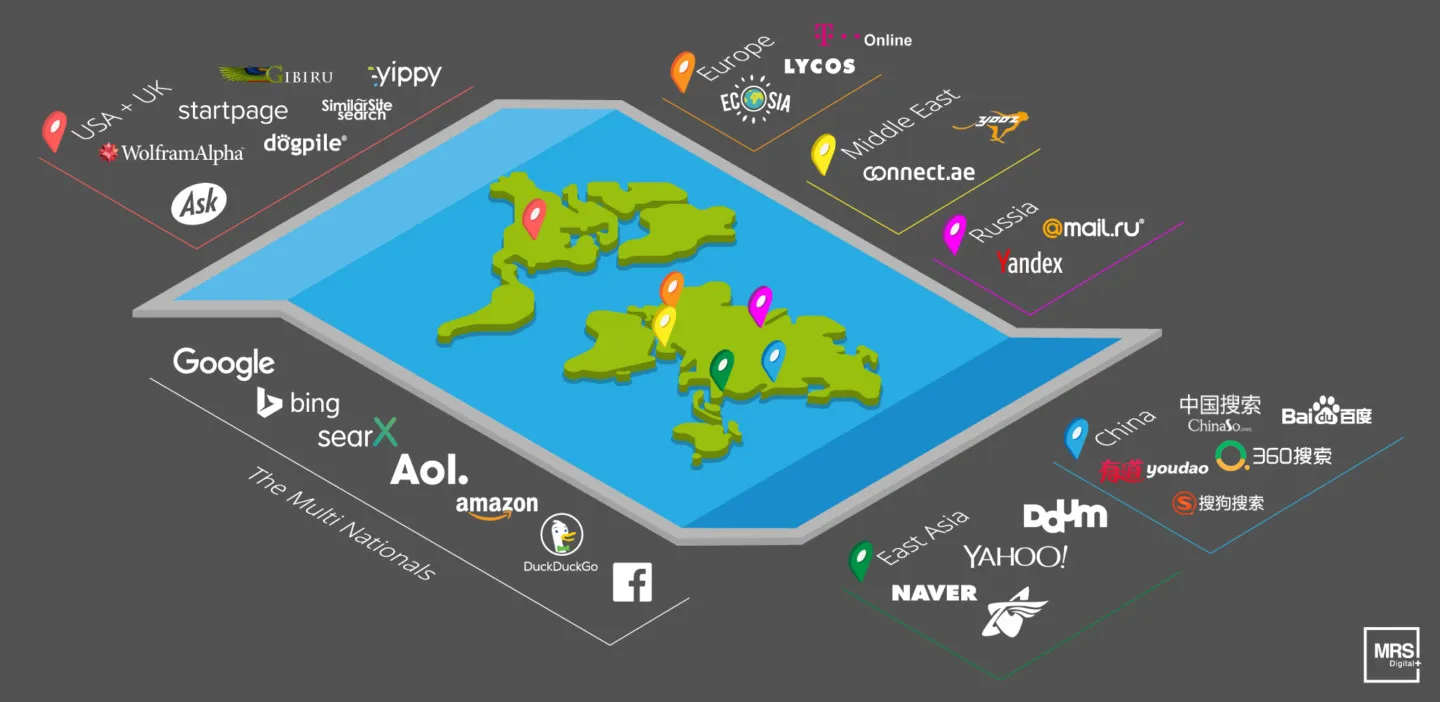With the all-consuming monolith that is Google continuing to absorb more and more of the global search market, we thought it would be fun to step out of the Google-verse and explore some of the lesser known search engines from around the world.
It’s Google’s world… we just live in it
- Est. 4 September 1998, Menlo Park, California
- Dominates Europe and USA
- 4.4 million searches a day
- Largest global market share
- 77% global market share
- +10% increase in market share in the past year
- Android has a 86% market share
Internet search is now a way of life. Thanks to easy access to the internet throughout the world, it’s estimated that 6,586,013,574 searches are made every day.
In words that’s six billion, five hundred and eighty-six million, thirteen thousand, five hundred and seventy-four.
That’s a LOT of Googling.
And the fact that we call the searching for things on the internet “Googling” goes to show the impact of Google on the digital landscape.
The former darlings of the search engine space like AOL and InfoSeek have either died out or are now under the yoke of their former competitors.
As AOL declined after its merger with Time Warner, so did its search engine, and was snapped up by Google.
InfoSeek ambitiously tried to charge people for the pleasure of searching, failed, went down the “banner ads everywhere!” model of monetisation, became a generic “portal,” and was finally also salvaged by Google.
Unique Search Engines
Some of you may be away of some of the bigger names in Russia (Yandex) and China (Baidu), but there are markets across the world that use totally regional or unique search engines.
For example, in Iran, you can search freely on Yooz Iran, while in Japan, Yahoo! is an unlikely, but perfectly viable search option.
Yooz, like North Korean’s Red Star search provider, is a state-managed search engine. Yooz was designed to help Iranians circumvent the US-led economic sanctions imposed over Tehran’s controversial nuclear programme.
It also grants the academic world the access to the Persian cyberspace. Yooz search engine has 100,000 hits and more than 60,000 searchers per day.
In 2009 Yahoo acquired Maktoob, which is a popular web portal in the region that offers services ranging from search, to email, to auctions, and more. Today Yahoo! Japan is more than search engine. It runs an online auction site while eBay has almost no presence in Japan.
It also runs the most popular Q&A site while Quora is not even localised in Japanese. By going deep on providing a highly focused, localised service portal, Y!J is made serious headway in Japan.
Yahoo! and Google use the same algorithm
SEO for one gets you ranking in both
Top 3 Daily Search Engines
Google 4,464,000,000
Bing 873,964,000 Baidu 583,520,803
Specialists are still able to survive in the Google-verse
Search engines are still able to thrive because they focus their lens on a specific elements, whether that’s a service offering or a region-specific aspect. Giants like Google, Bing, and Yahoo! pretty much dominate the general market, so the others have had to specialise to survive.
The Chinese market, for example, has no access to Google so regional search engines have an easier time of competing in the search market. Yamli is specifically targeted to Arabic-speaking users.
Wolframalpha markets itself as a “Computational Knowledge Engine”, which can give you facts and data for a number of topics. It can do all sorts of calculations.
For example if you enter “mortgage 2000” as input it will calculate your loan amount, interest paid etc. based on a number of assumptions.
As an experienced international SEO agency, our expertise extends beyond Google, allowing your business to rank in the world’s most popular search engines.
We work with both your core business and regional offices to help you expand in the global market, by making your business influential and relevant in countries all over the world.







